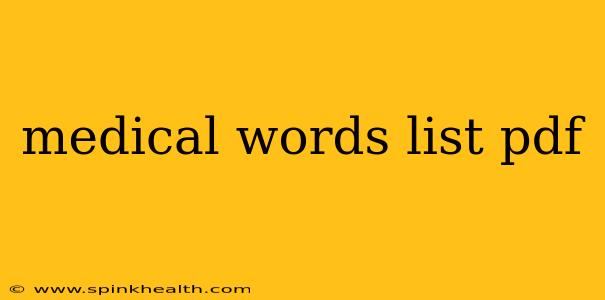Building Your Medical Vocabulary: A Journey Through Essential Terms
Learning medical terminology can feel like climbing a steep mountain, but with the right approach, it becomes a rewarding journey. This isn't just about memorizing a long list of words; it's about understanding the building blocks of medical language and how they combine to create meaning. Think of it as learning a new language, one that unlocks a deeper understanding of the human body and its complexities. This article will guide you through some key concepts and offer strategies for building a strong medical vocabulary, effectively answering common questions many learners have.
Where can I find a comprehensive list of medical words?
This is a common starting point for many aspiring medical professionals or anyone curious about medical terminology. While there isn't one single, universally accepted "definitive" list in PDF form (as the field is vast and constantly evolving), several excellent resources provide comprehensive lists and dictionaries. Your best bet is to explore online medical dictionaries and glossaries. Many reputable websites and educational institutions offer free access to such resources. These often allow you to search for specific terms or browse by category, making it easier to find the words you need. Some medical textbooks also include extensive glossaries at the back.
What are some common medical prefixes, suffixes, and root words?
Understanding the building blocks of medical terms is crucial. Many medical words are formed by combining prefixes (beginning parts), suffixes (ending parts), and root words (core meaning). For example, "cardio" (heart), "pulmonary" (lungs), "gastr" (stomach), "-itis" (inflammation), "-ectomy" (surgical removal), and "hypo-" (below) are common elements. Once you learn these components, you can decipher the meaning of many new terms. Consider investing in a medical terminology textbook or using online resources that break down word structures to help you understand this fundamental aspect of medical vocabulary.
Are there any free medical terminology PDF downloads available?
While readily available, comprehensive, free PDF downloads of complete medical word lists are less common than other resource types. The reason is that creating and maintaining such a resource requires significant effort and expertise. Copyright restrictions also often limit the free distribution of extensive medical terminology compilations. However, many websites provide free access to medical dictionaries and glossaries. You can search for specific terms or explore categorized lists; these are often more practical than trying to digest an extensive, static PDF. Remember that the medical field is constantly evolving, so dynamic online resources are often better updated than static documents.
How can I learn medical terms effectively?
Learning medical terminology is an ongoing process. Here are some effective strategies:
- Start with the basics: Begin by mastering common prefixes, suffixes, and root words. Focus on the most frequently used components.
- Use flashcards: Flashcards are a proven method for memorizing vocabulary. Create flashcards with the term on one side and the definition on the other.
- Practice regularly: Consistent, short study sessions are more effective than infrequent, lengthy ones. Try to incorporate medical terminology into your daily routine.
- Use context: When you encounter a new term, try to understand its meaning within the sentence or paragraph. Pay attention to the surrounding words to get context clues.
- Test yourself: Regularly test your knowledge to identify areas where you need more work.
- Relate to real-world scenarios: Try to link the terms to real-world medical situations or cases to improve your understanding and recall.
The journey to mastering medical terminology is a marathon, not a sprint. By using a combination of these techniques and utilizing available online resources, you can steadily build a robust medical vocabulary and improve your understanding of this crucial field. Remember, consistent effort and engagement are key to success.

